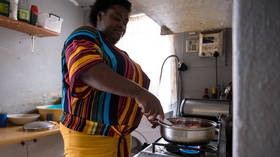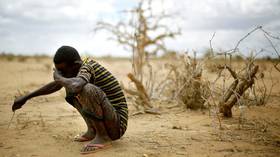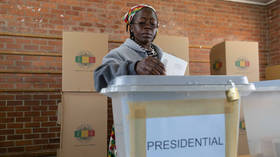Fueling Africa: How cooking gas can reshape the post-colonial economy

Discussions on ensuring Africa’s energy security usually come down to providing access to electricity, developing power grid infrastructure, and supplying fuel for transportation. However, the challenges faced by households in Africa are often left out. Despite the seemingly insignificant market, the consumption of energy resources by African households is growing each year. Moreover, in all African countries, households occupy an important place in the structure of energy consumption – their share ranges from 20-30% in industrially developed countries (e.g. Algeria, Morocco) to 90% in small, mostly agrarian countries (e.g. the Central African Republic).
What Africans use to make fire
Along with improvements in the quality of life, changing consumer habits, and growing urbanization, Africa’s fuel structure is also undergoing a transformation. Traditional fuels are being replaced by modern and more environmentally friendly energy: Methane, propane-butane, and electricity are gradually replacing firewood, brushwood, and household waste.
For African households, energy access comes with certain challenges. Firstly, due to the warm climate, heating solutions (including heating infrastructure) that are widely used in temperate climates are not suitable for Africa. Secondly, due to the lack of natural gas transmission infrastructure, it is impossible to provide households with natural gas (methane), like in Europe. The only exception is Algeria – a country which has a developed gas transmission system and where household gas consumption amounts to 11 billion cubic meters annually (this is comparable to the volume of Nigeria’s domestic market). Thirdly, the shortage of electricity generation capacities and the deplorable condition of electric power distribution infrastructure make power grids an unreliable source of energy. These are all long-term issues, and they are sure to influence the situation in Africa for the next 20-30 years.
But Africa needs energy now, and this need increases with each passing year. Around 65% of the population (800 million people) of sub-Saharan Africa still uses firewood and similar means for cooking and heat. Moreover, the energy should be ‘mobile’, meaning it should be quickly delivered from the manufacturer to the consumer in relatively small volumes and at an adequate price.
Cooking kills?
Providing Africans with clean fuel for heating homes and cooking isn’t just a matter of comfort – it is essential for the health of the African population. Every year, about 1 million people in Africa die from diseases related to air pollution, and using firewood and other solid materials for cooking food plays a large part in this.
According to the World Health Organization (WHO), in Nigeria alone, over 98,000 women die every year due to respiratory diseases caused by the use of firewood. Cooking breakfast, lunch, and dinner on such fuel is almost like smoking up to 20 packs of cigarettes a day. The UK’s Clean Air Fund estimated that the transition to cleaner fuels will save up to 120,000 lives in Africa annually.
What is cooking gas
The people of Africa understand that the above-mentioned challenges can all be solved by using liquefied petroleum gas (LPG).
LPG is a mixture of propane and butane obtained from associated petroleum gasses or during oil distillation. Liquefied petroleum gas – familiar to most of us as the liquid in a regular lighter, or as ‘cooking gas’ – is an oil product, and should not be confused with liquefied natural gas (LNG) which is obtained by liquefying methane.
Consumption of LPG in Africa grows by 10% each year on average. In Nigeria, over the past ten years, LPG consumption has increased almost five times from 300,000 tons to 1.4 million tons, and in Kenya, it has grown four times (from 100,000 to 400,000 tons). Liquefied petroleum gasses will continue to replace kerosene, firewood, waste, and manure as fuel in the household sector (used primarily for cooking). In total, Africa consumes around 14 million tons of LPG annually (4% of the world market), or 14kg per person (the lowest indicator in the world – for example, the figures for Asia and Latin America are 27kg and 53kg, respectively).
Cooking gas can help Africa, but there is a problem
Currently, the main obstacle to using this environmentally friendly and much safer household fuel is the lack of infrastructure – such as receiving terminals, storage facilities, and delivery means. The overall trend, however, is positive. Nigeria is opening new LPG terminals, and the world’s largest LPG-fueled power plant (200 MW) is being built in Ghana.
Despite the fact that several African countries export LPG to world markets, Africa itself is largely dependent on imports from abroad. For example, while Nigeria is a net exporter of LPG, 500,000 tons of its domestic volume of LPG are imported (mainly from the US). The Nigerian LPG market (as well as the oil and gas market) is clear evidence of the shadow of African postcolonialism, but even against this background it stands out in terms of absurdity.
Nigeria is forced to import LPG, despite the fact that it also exports this fuel gas. Nigeria is home to Nigeria LNG – one of the world’s largest LNG plants, which also produces LPG. In 2022, 700,000 tons were exported, while only 400,000 tons were sent to the domestic market. Despite the promises of the Nigerian National Petroleum Corporation (NNPC) to sell 100% of the LPG that it produces domestically, these resolutions will be difficult to implement in the medium term.
As a rule, large tankers export LPG from the Nigeria LNG plant (as well as from other Nigerian terminals) and then the same LPG (under the same brands, and sometimes completely identical) is imported to Nigeria, but in smaller batches and via other ports. For the shareholders of the plant (which, in addition to the NNPC, include Shell, Eni, and Total), it is inconvenient and unprofitable to use small tankers to ship LPG, and Nigeria does not have any infrastructure for receiving and unloading large tankers (the almost non-existent storage facilities are one of the greatest obstacles to the import and export of any energy carriers to and from Africa). The infrastructure was built in such a way as to ensure exports and sometimes imports, but by no means does it meet the needs of domestic trade.
Are the kitchens ready?
In addition to infrastructure issues, the unpreparedness of consumers also prevents the growth of LPG consumption in Africa. The key potential consumers of LPG are low-income segments of the population who spend most of their money on food and basic needs. Often, they simply do not have enough money to buy the necessary equipment and update their kitchen, which costs about $150. Meanwhile, alternative fuels such as firewood, brushwood, and kerosene are a lot cheaper, and sometimes cost nothing at all. Firewood can be found in the backyard or in the nearest grove, but this in turn contributes to the loss of forest cover and the destruction of ecosystems.
Safety and compliance with technical regulations pose another challenge for LPG use. Issues like insufficient technical supervision and virtually no equipment inspections often lead to tragedies. For example, in Boksburg – a suburb of Johannesburg, South Africa – more than 50 people died as a result of two accidents (a gas tanker explosion and a gas leak) in less than a year. The explosion of a gas cylinder in the Nigerian city of Kano led to the death of nine people, and about a month later an explosion in a gas cylinder store injured more than 20 people and caused a major fire in the city.
LPG is Africa’s future
Despite all the challenges, LPG will become a bestseller in Africa in the long term, since it is essential for preserving forests and improving the quality of life for the people of Africa. These tasks will entail investments in the construction of necessary infrastructure. However, the process also works the other way around – the success of LPG in local markets is determined by the infrastructure needed for its storage and distribution, and LPG markets in African countries can grow considerably as a result of such investments.















